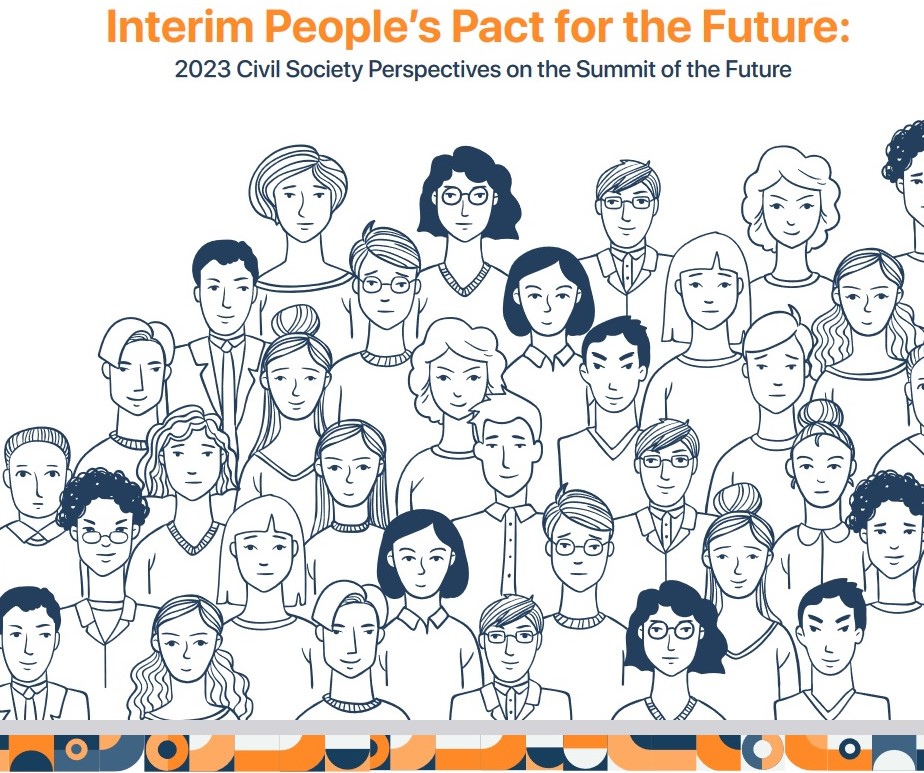Berlin, May 23, 2023
United Nations member states should use the occasions of the 2024 UN Summit of the Future and its 2023 Ministerial Meeting to adopt strong and effective multilateral measures to prevent war, eliminate nuclear weapons, build human security and protect our global ecosystems for the benefit of current and future generations, according to an interim People’s Pact for the Future which was released on May 18th.
The Pact is being presented on May 24th, International Women’s Day for Peace and Disarmament, to the German Foreign Ministry in a consultation meeting with civil society organizations and to the German Parliament in a private meeting with the Subcommittee on Disarmament, Arms Control and Non-proliferation. The presentations to the German government and parliament are important because Germany is playing a key role as one of the two facilitators for the Summit of the Future.
The People’s Pact for the Future was developed through six months of deliberations involving over 2000 civil society participants along with consultations with UN Member State delegates, UN Secretariat officials and other stakeholders in the UN Summit of the Future. The process has been coordinated by the Coalition for the UN we Need.
“The goal is to ensure that the urgent need for reform of the multilateral system benefits from perspectives from all countries and populations, women and men, and all generations in order to respond to today’s challenges of building a peaceful and flourishing global society” says Maria Fernanda Espinosa, Co-Chair of the Coalition for UN We Need, during the launch of the People’s Pact.
“The existential threats to humanity from nuclear weapons and climate change demonstrate that global problems need common security solutions with better global governance,” says Alyn Ware, Co-facilitator of the Peace and Security consultations for the People’s Pact for the Future. “The five peace and security proposals in the Peoples Pact for the Future provide feasible approaches to end war, resolve international conflicts in peaceful ways, eliminate nuclear weapons and refocus the bulk of the $2.3 trillion global military budget on sustainable development.”
“The Subcommittee on Disarmament, Arms Control and Non-Proliferation of the German Bundestag discusses and supports peace and security related initiatives of the Federal Government since almost 40 years,” says Ute Finckh-Krämer, Council Member of Parliamentarians for Nuclear Non-proliferation and Disarmament and a former member of the Bundestag Subcommittee. “I hope the Subcommittee will support the five peace and security proposals in the Peoples Pact and encourage the Federal Government to support them also.”
“The threats to our atmosphere, waters, biosphere and geosphere (mineral resources) have arisen from national and corporate competition unchecked by international governance and law,” says Neshan Gunasekera, Co-Chair of the Earth Trusteeship Working Group and Councilor, World Future Council. “The People’s Pact calls for establishment of a Global Environmental Governance Agency that balances national and corporate interest with Earth Trusteeship in order to protect Earth’s ecosystems. This could include a re-purposing of the UN Trusteeship Council to initially provide governance of our global commons and then be extended to governance over all ecosystems including through an Office for the Envoy on Future Generations.”
“Youth engagement in decision-making on peace, environment and human rights issues is vital, and especially for the Summit of the Future,” says Vanda Proskova, Core Team Member of Youth Fusion and Co-facilitator of the Digital Compact consultations for the People’s Pact for the Future. “The Peoples Pact includes some important recommendations, including that every government delegation to the Summit include a youth representative and that UN mechanisms and processes should be made more child and youth friendly. In addition, the Pact highlights the importance of inter-generational approaches rather than putting youth engagement into a silo.”
“The United Nations was established to serve ‘We the Peoples’ of the world, but is governed primarily by UN member States,” says Andreas Bummel, Executive Director of Democracy without Borders. “Democratic governance for a peaceful and sustainable world would be enhanced considerably by the establishment of a UN Parliamentary Assembly, as recommended in the People’s Pact.”
“The World Future Council strongly supports the proposal by the Secretary-General of the UN for an Envoy of Future Generations,” comments Alexandra Wandel, Chair of World Future Council the Management Board. “As highlighted in the interim people’s pact, the interests of future generations need to be addresses across all policy proposals, whether short-term or long-term. The crises humanity faces today demand urgent action.”
“Women’s International Action Day for Peace and Disarmament was established from the annual European women’s anti-nuclear marches that started on Hiroshima Day, August 6, 1981,” says Eva Quistorp, former Member of the European Parliament and Co-founder of German Women for Peace. “With Putin’s brutal war against Ukraine we all need to learn from women peace actions and the struggle for freedom from women in places like Belarus or Myanmar and provide support for them.”
The recommendations contained in the Interim People’s Pact are driven by five key objectives: a longer-term future orientation, global institution reform, a whole of society approach, meeting existing commitments, and building trust. The seven thematic areas chosen for deliberation are based on a combination of the pillars of the United Nations and the tracks identified in the UN Secretary-General’s Our Common Agenda report. They include development and the SDGs, environmental governance, human rights and participation, the global digital compact, the global economic and financial architecture, peace and security, and UN and global governance innovation.
“The urgency of the moment calls for concrete reform of the international order”, said Dan Perell, Co-Chair of the Coalition for the UN We Need “given the profound challenges humanity is facing, Member States must seize the rare opportunity of this sequence of Summits to imagine, and bring into being, a flourishing world characterized by justice and equality.”
The Coalition for the UN We Need has created an interactive platform that calls on individuals to read the People’s Pact and provide feedback, in a bid to ensure that comprehensive considerations are made on all perspectives towards developing recommendations that address concerns of both present and future generations.
Contacts:
Alyn Ware, alyn@pnnd.org. Mobile/WhatsApp +420 773 638 867
Alexandra Wandel, alexandra.wandel@worldfuturecouncil.org. Phone/WhatsApp +49 172 748 3953
Jeffery Huffines, jeffery@c4unwn.org. Phone: +1 646 707-1060

